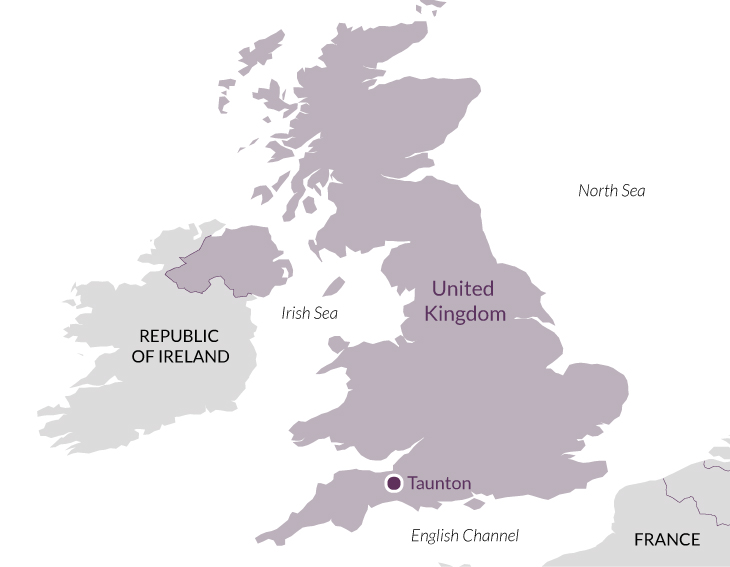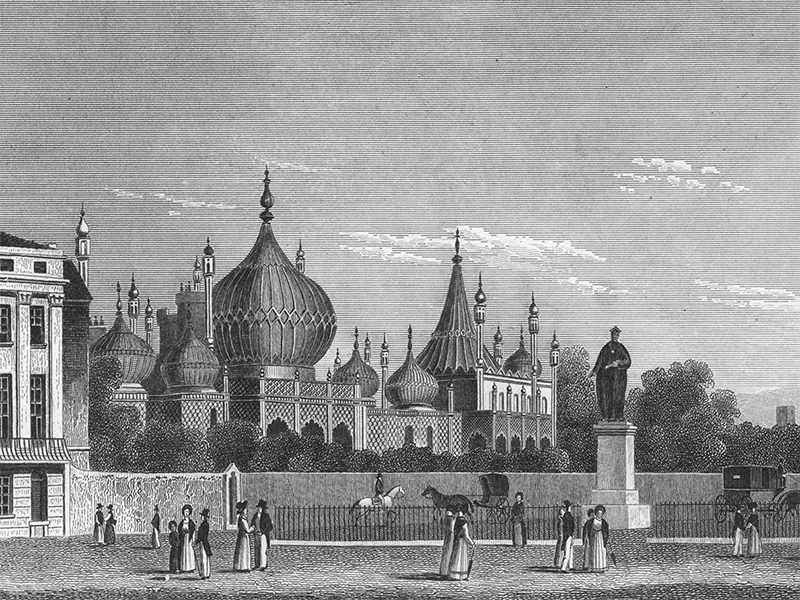Overview
The latest in our highly successful series of symposia, this residential weekend will explore the era of George III, the Regency and George IV. In a programme that aims to capture the essence of the age, leading scholars will give a series of 40-minute talks, encompassing history and politics, art and architecture, science and social mores. They promise to add colour, breadth and detail to our understanding of Hanoverian Britain.
The excellent Castle Hotel, Taunton, is our host. Renowned for its service, comforts and superb catering, it has been owned and run by the Chapman family for over 60 years. The symposium takes place in the Music Room.
The speakers are Professor Jeremy Black (Exeter), Professor Arthur Burns (Kings College, London), Professor Penelope J. Corfield (Royal Holloway); Dr Patricia Fara (Cambridge); Professor Mark Hallett (Paul Mellon Centre); Professor Bob Harris (Oxford), Jacob Moss (Fan Museum) and Dr Geoffrey Tyack (Oxford).
Speakers
Professor Jeremy Black. Professor of History at the University of Exeter. He is an expert on 18th-century Britain and North America and has written biographies of George II and George III, studies of British politics, foreign policy, culture and war. Publications include Fighting for America. The Struggle for Mastery in North America, 1519–1871 and The War of 1812. His latest book, England in the Age of Austen will be published in 2020.
Professor Arthur Burns. Professor of Modern British History, Kings College London, and Academic Director of the Georgian Papers Programme, a ten-year interdisciplinary project to digitise, conserve, catalogue, transcribe, interpret and disseminate 65,000 documents in the Royal Archives and Royal Library relating to the Georgian period, 1714–1837.
Professor Penelope J. Corfield. Professor Emeritus in the Department of History, Royal Holloway, University of London, and Visiting Professor at the University of Newcastle-UK. She is also Vice President of the International Society for Eighteenth-Century Studies and an elected Member of the Academia Europaea/ Academy of Europe.
Dr Patricia Fara. Emeritus Fellow of Clare College and former President of the British Society for the History of Science. She has a degree in physics from Oxford and a PhD in History of Science from London. Based at Cambridge University since 1993, her books include the prize-winning Science: A Four Thousand Year History, Newton: The Making of a Genius and Pandora’s Breeches: Women, Science and Power in the Enlightenment.
Professor Mark Hallett. Professor of History of Art and Director of Studies at the Paul Mellon Centre, overseeing all aspects of the Centre’s activities towards stimulating research into the history of British art and architecture. He was formerly Head of Department at York University. He has published widely and co-curated numerous exhibitions, among them Hogarth at Tate Britain and Joshua Reynolds: Experiments in Paint at the Wallace Collection.
Professor Bob Harris. Professor of British History, Worcester College, Oxford, since 2006. He previously held a personal chair in British History at the university of Dundee. He specialises in political, social and urban aspects of the 18th and early-19th centuries. Books include co-authorship of The Scottish Town in the Age of the Enlightenment, 1740–1820, which won the Saltire Society’s Book of the Year prize, and Politics and the Rise of the Press: Britain and France 1600–1800.
Jacob Moss. Curator, The Fan Museum, Greenwich. Having obtained a postgraduate degree in Fashion Curation from London College of Fashion, Moss took up a position at The Fan Museum, the UK’s only Museum dedicated to the history of fans and fan making. He is responsible for co-organising its active programme of exhibitions and events. He recently joined The Arts Society Directory of accredited lecturers.
Dr Geoffrey Tyack. Architectural historian specialising in the 18th–20th centuries in Britain and Europe. A Fellow of Kellogg College, University of Oxford, he is the author of John Nash: Architect of the Picturesque and Editor of the Georgian Group Journal.
Friday 13 March | Afternoon
Afternoon (session 1), including refreshment break, 3.00pm–6.00pm.
Talk 1: Professor Mark Hallett
A new world of art: the exhibitions of Georgian London
Talk 2: Dr Geoffrey Tyack
The rebuilding of Georgian provincial towns: architecture and planning
Talk 3: Dr Patricia Fara
Joseph Banks – Botanic Macaroni and Imperial Designer
Drinks reception and dinner.
Saturday 14 March | Morning
Morning (session 2), including refreshment break, 9.30am–1.00pm.
Talk 4: Professor Penelope J. Corfield
From the Deep Bow or Curtsey to the Egalitarian Handshake: changing styles of interpersonal greetings in 18th-century Britain
Talk 5: Professor Mark Hallett
Making faces: Reynolds and Georgian portraiture
Refreshment break
Talk 6: Professor Bob Harris
The Creation of North Britain: The Rise of Loyal Scotland
Talk 7: Professor Arthur Burns
George III as revealed in the Georgian Papers
Saturday 14 March | Afternoon
Afternoon (session 3), 3.15pm–6.30pm.
Talk 8: Professor Jeremy Black
Britain and the Making of America
Plenary, chaired by Professor P.J. Corfield
Refreshment break
Talk 9: Jacob Moss
From Venus to Vesuvius: Fans and the Classical influence in the Georgian era
Talk 10: Dr Patricia Fara
Minervas of Science: Why Women Counted
Dinner.
Sunday 15 March
Morning (session 4), 9.30am–1.00pm.
Talk 11: Professor Jeremy Black
The Strength of the British System and the Struggle in Europe
Talk 12: Professor Bob Harris
Popular Radicalism in the era of the French Revolution
Refreshment break
Talk 13: Professor Penelope J. Corfield
Personal Merit is the Only True Nobility’: New ideals of social leadership in 18th-century Britain
Talk 14: Dr Geoffrey Tyack
John Nash and the making of Regency London
Prices, per person
Two sharing: standard double or twin £780; garden room £860.
Single occupancy: single room (single bed) £780. We are able to offer double rooms for sole use for £830 – please let us know at the time of booking if you would be interested in upgrading.
Included
Hotel accommodation for 2 nights; breakfasts and 2 dinners with wine; admission to the talks; drinks reception; refreshments during breaks; gratuities for hotel staff.
Accommodation
The Castle Hotel Taunton: the hotel’s 44 bedrooms are individually and charmingly decorated and well equipped. The largest – the Garden Rooms – are in the remains of the 12th-century castle overlooking the garden, and are the equivalent of Junior Suites, with a sitting area and separate dressing room. Doubles and twins are mainly of a good size and vary in outlook. Single rooms, while comfortable, are small and generally less well appointed with single beds – for this reason we do not charge a single supplement for them. The majority of rooms have a bath with a shower fitment. Only two rooms in the hotel have walk-in showers.
The hotel has a lift, though some bedrooms do then involve some step access. There are no bedrooms on the ground floor. The Music Room is on a mezzanine level, which can only be reached via a flight of stairs from the lobby.
Group size
Maximum 76 resident participants
Talks only
If you wish to participate in the talks only, without accommodation, tickets are priced at £45 for session 1; £60 each for sessions 2, 3 and 4, or £200 for all four sessions combined. Refreshments during breaks are included, but not lunches or dinners. Please contact us by telephone on 020 8742 3355 to book on the individual sessions.

'Thank you for organising such an outstanding event. I feel so lucky to have been part of the audience to heat so many thought provoking talks.'
'There was a very high standard in knowledge and presentation.'
'What a terrific array of speakers.'
